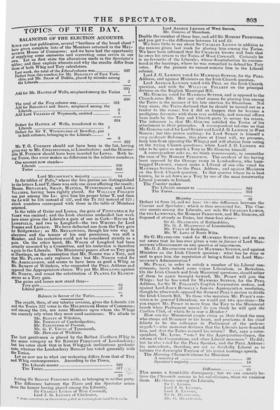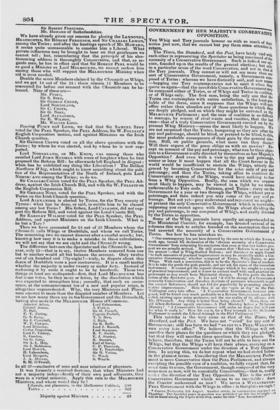The result, then, of our tabular revision, gives the Liberals
336 and the Tories 322 votes in the MELBOURNE House of Commons; and among the 336, are some Members upon whom the Whigs can scarcely rely when they most need assistance. We allude to Mr. BENETT of Wiltshire, Mr. TOWNLEY of Cambridgeshire, Mr. FLEETWOOD of Preston, Mr. G. F. YOUNG of Tynernouth, Mr. HOWARD of Wicklow.
The last gentleman is placed by the Belfast Northern Whig in the same category as Sir ROBERT FERGUSON of Londonderry; but his votes show that in him Whiggish inclinations predotni- nate, whereas the Londonderry Baronet has voted generally with the Tories.
Let us now see in what our reckoning differs from that of Tory and Whig contemporaries. According to the Times,
The Liberals muster 340 The Tories 317
23
Setting Sir ROBERT FERGUSON aside, as belonging to neither party. The difference between the Times and the Spectator arises from the former having placed among the Liberals,
Sir CHARLES LF:MON of West Cornwall,
Lord J. G. LENNOX of Chichester, * Some corrections in the numbers polled at various places have'been.makbo. Lord ARTHUR LENNOX of West Sussex, Mr. GORING of Shoreham.
Double the number of these four, and add Sir ROBERT FERGUSON, and you get 9—the difference between 14 and 23.
We have little to say about Sir CHARLES LEMON in addition to the reasons given last week for placing him among the Tories. We have been informed that Sir CHARLES knows and feels that he owes his return to the Tories of West Cornwall. Certainly he is no favourite of the Liberals; whose dissatisfaction he encoun- tered at the hustings, where he was compelled to defend his Tory votes. For the present we cannot remove him to the Liberal column.
Lord J. G. LENNOX voted for MANNERS SUTTON, for the PEEL Address, and against Ministers on the Irish Church question.
Lord ARTHUR LENNOX voted with PEEL on the Irish Church question, and with Sir WiLLt %at FOLLETT on the principal division on the English Municipal Bill.
Mr. GORING voted for MANNERS SUTTON, and is opposed to the Church ratesBill. But our chief reason for placing him among the Tories is the manner of his late election for Shoreham. Not long since, the Tories declared that he should be turned out as a traitor to the cause; but it did so happen that he became a prodigious favourite with them very suddenly, and unusual efforts were made by the Tory and Church party to secure his return. The inference is, that Mr. GORING satisfied the Tories of his attachment to their principles. A correspondent informs us that Mr.GORING voted for Lord SURRY and Lord J. G. LENNOX in West Sussex; but this proves nothing; for Lord SURRY is himself a very moderate Reformer, (his place at Court will, we presume, keep him from opposing the Whigs,) and will abstain from voting on the trying Church questions; while Lord J. G. LENNOx we take to be quite as much a Tory as Mr. GORING himself. A correspondent asks us, we think unnecessarily, to reconsider the case of Sir ROBERT FERGUSON. The accident of his having been opposed by the Orange rump in Londonderry, who hum- bugged DAWSON, cannot make a Liberal of one who voted for MANNERS SUTTON, for the PEEL Address, and against Ministers on the Irish Church question. In that quarter where he is beat known, he is set down as a Tory by one of the most trustworthy Liberal journals in Ireland.
The Courier makes
The Liberals amount to 345 The Tories 313 Majority 32
Deduct 14 from 32, and we have 1S—the difference between the Courier and Spectator ; which is thus accounted for. The Cou- rier counts among the Liberals, not only Sir CHARLES LEMON, the two LENNOXES, Sir ROBERT FERGUSON, and Mr. GORING, all disposed of already as Tories, but these four also— Sir G. DEA THCOTE of Rutlandshire, Mr. G. J. HEATHCoTE of Lincolnshire, Mr. PUSEY of Berkshire, Mr. W. LONG of North Wilts.
Sir G. HE ATHCOTE voted for MANNERS SUTTON; and we are not aware that he has ever given a vote in favour of Lord MEL- BOURNE'S Government on any question of importance. Mr. G. J. HE ATHeOTR voted for MANNERS SUTTON, and against Ministers on the )rich Church question: what has he done or said to gain him the reputation of being a friend to Lord MEL- BOURNE'S Administration ?
Mr. PUSEY. in order to satisfy a number of his Liberal con- stituents, lately talked some vague Liberalism, in Berkshire. On the Irish Church and Irish Municipal questions, should either of them be again brought forward, Mr. PUSHY will join the Whigs : but he has voted for MANNERS SUTTON, for the PEEL Address, for Sir W. FOLLETT'S English Corporation motion, and against Lord JOHN RUSSELL'S famous Appropriation resolution, though he afterwards opposed Sir ROBERT PEEL'S motion to divide the Irish Church Bill. To those who maintain Mr. PUSEY'S con- version to general Liberalism, we would put two questions—Do you expect Mr. PUSEY to move from the Tory to the Ministerial bench when Parliament meets? do you think he will quit the Carlton Club, of which he is now a Member ?
How can the Ministerial people claim as their friend the man who clasps old BurtnErr to his heart, and proclaims it his chief felicity to be the colleague in Parliament of the arch-re- negade?—who moreover declares that the Liberals have deserted him, and that the Tories secured his return? But, says a corre- spondent, Mr. LONG " vottz! for the Appropriation-clause, the reform of the Corporations, and other Liberal measures." He did; but he also voted for the PEEL Speaker, and the PEEL Address : his antecedents, therefore, are not so decidedly Liberal as to balance the downright Toryism of his recent hustings speech. The Morning Chronicle claims for Ministers A majority of 39 Spectator's majority 14 Difference 25
This seems a formidable discrepancy; but we can scarcely be-
lieve the Chronicle serious in his calculations, when we examine them. He classes among the Liberals,
Sir C. Li:mom, Lord J. G. Li:NNox, Lord A. 1.1:NNox, Sir G. HEATHCOTE,
Mr. G. 11EATiitun:,
Sir ROBERT FERGUSON, Mr. HOWARD of Sutherlandsbire.
We have already given our reasons for placing the LENNOXES, HEATHCOTES, Sir ROBERT FERGUSON, and Sir CHARLES LEMON, among the Tories; and after the hustings speech of Mr. HOWARD, it seems quite unreasonable to consider him a Liberal. What private influences may be brought to bear on that gentleman we cannot tell ; but, remembering that the principle of his elec- tioneering address is thoroughly Conservative, and that, as re- gards men, he has in effect said that Sir ROBERT PEEL would be as good a Minister as Lord MELBOURNE, we cannot reckon him among those who will support the MELBOURNE Ministry when aid is most needed.
Double the seven Members claimed by the Chronicle as Whigs, and we get 14 out of the 25 : there remain 11 Members to be accounted for before our account with the Chronicle can be ba- lanced. Nine of these are—
Mr. PUSEY, Sir S. SPRY, Sir GEORGE CREWE, Lord NORTHLAND, Sir C. COOTE, Sir G. NOEL, Lord ALEXANDER, Sir E. WILMOT, Mr. WALTER LONG.
Passing PUSEY and LONG, we find that Sir SAMUEL SPRY voted for the PEEL Speaker, the PEEL Address, Sir W. FOLLETT'S English Corporation motion, and against Ministers on the Irish Church question. Sir GEORGE CREWE voted on all the above questions with the Tories; by whom he was elected, and by whom he is now sup- ported.
Lord NORTHLAND, AS Mr. KNOX, was among those who assailed Lord JOHN RUSSELL with roars of laughter when he first proposed the Reform Bill : he afterwards left England in disgust : when has he exhibited any thing like Liberalism ? The Belfast Northern Whig, which ought to know something about the poli- tics of the Representatives of the North of Ireland, puts Lord NORTH! AND among the Tories; so do we.
Sir CHARLES COOTE voted for the PEEL Speaker, the PEEL Ad- dress, against the Irish Church Bill, and with Sir W. FOLLETT on the English Corporation Bill. Sir GERARD NOEL voted for the PEEL Speaker, and with the Tories on the Irish Church question.
Lord ALEXANDER is elected by Tories, for the Tory county of Tyrone: what has he done, or said, to entitle him to be classed among any but Tories? His father, Lord CA LE DON, did not sup- port the Reform Bill, and voted against the Local Courts Bill.
Sir EARDLEY WILMOT voted for the PEEL Speaker, the PEEL Address, and against Ministers on the Irish Church. What is he but a Tory?
Thus we have accounted for 23 out of 25 Members whom the Chronicle calls Whigs or Doubtfuls, and whom we call Tories. The remaining two we cannot discover after a careful search; but, knowing how easy it is to make a mistake in these calculations, we will not say that we are right and the Chronicle wrong. The difference between the Spectator and the Chronicle is, how- ever, only 25—that is to say, twelve Members removed from one list to another would all but balance the account. Only twelve out of six hundred and C:fty-eight!—truly, to dispute about this dozen of Doubtfuls were a poor controversy. It is a small matter whether the majority is under twenty or under forty. Instead of reckoning it by units it ought to be by hundreds. These two things at least are undisputed—first, that Lord MELBOURNE has lost seine votes, be they more or fewer, by the dissolution which was expected to strengthen him ; secondly, that such an occur- rence, at the commencement too of a new and popular reign, is altogether unprecedented. Why, the very Ministers and Place- men amount to more than the disputed number of Members. Let us see how many there are in the Government and the Household, having also seats in the MELBOURNE House of Commons.
Lord Palmerston, J. Parker, Sir H. Parnell, Captain Pechell, T. S. Rice, J. Rich, Sir R. Rolfe, Lord J. Russell, Lord Seymour, R. V. Smith, E. J. Stanley, R. Steuart, Earl of Surry, C. P. Thomson, Sir T. Trouhridge, Sir H. Vivian, C. Word, S. Woulfe.
In all 37—exclusive of sons and near relatives of placetnen. It was formerly a received doctrine, that when Ministers bad not a majority independently of their own paid adherents, they were in a virtual minority. Apply this rule to the MELBOURNE Ministers, and where would they be ?
Liberals, not placemen, in the Melbourne Cabinet, "AR
Tories 322
Majority against Ministers 23
Admiral Adam, Colonel Anson, N. Ball,
F. T. Baring,
G. S. Byng, Sir J. Campbell, W. F. Cowper, Lord Dalmeny, Cutlar Fergusson, Lord C. Fitzroy, R. Gordon,
Sir G. Grey, Sir A.. L. Hay, Sir J. Hobbouse, Lord Howiek,
H. Labouchere, Lord Morpeth, J. A. Murray, R. M. °Terra,



























 Previous page
Previous page